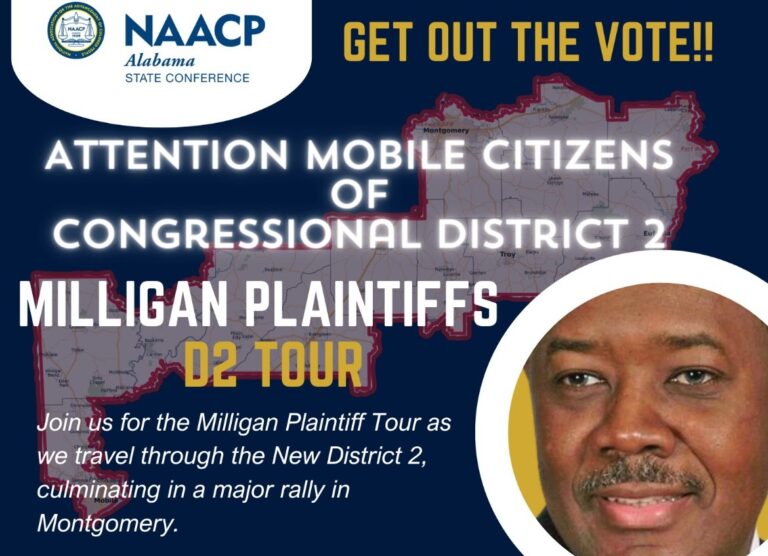(FOR IMMEDIATE RELEASE, Alabama) – On Dec. 2, one day after celebrating the 60th anniversary of Rosa Parks’ refusal to give up her seat on a bus in Montgomery, Alabama — an act that ignited the Civil Rights Movement — lawyers from the NAACP Legal Defense and Educational Fund, Inc. (LDF), and Covington & Burling, LLP, along with Alabama attorney Ed Still have filed a federal lawsuit challenging Alabama’s photo voter ID law. The lawsuit was brought on behalf of Greater Birmingham Ministries and the Alabama NAACP.
The complaint alleges that Alabama enacted a photo ID law that the State’s own initial analysis showed would disfranchise over a quarter of a million registered voters, a disproportionate number of whom are Black and Latino, in violation of the U.S. Constitution and the Voting Rights Act of 1965.
The photo ID law is one of three intentionally discriminatory measures passed by the 2011-12 Alabama Legislature. The other two — the State’s legislative redistricting plans and House Bill 56 — have already been successfully challenged in federal court. The lawsuit also comes shortly after Alabama’s decision to largely close 31 DMV offices, which has made it much more difficult for Black and Latino voters to get driver’s licenses, the most common form of photo ID.
“The State’s deliberate decision to enforce this discriminatory photo ID law, followed by the DMV office closures, has compelled us to take action,” said Sherrilyn Ifill, President and Director-Counsel of LDF. “It is appalling that, sixty years after Rosa Parks’ courageous protest in Montgomery and fifty years after voting rights activists marched in Selma, the Alabama Legislature continues to pass laws that are designed to deprive people of color of their basic civil rights.” LDF lawyers represented Montgomery residents challenging segregated buses and the Selma marchers.
 The complaint includes the story of a nearly 18-year-old high school student who will be unable to vote in the 2016 elections because she does not have a photo ID. The closest DMV office to her is open only one day a month, and she would need to travel more than 40 miles round-trip to a DMV office with more generous hours. But, she has never driven and there is no public transportation from her hometown to either DMV office.
The complaint includes the story of a nearly 18-year-old high school student who will be unable to vote in the 2016 elections because she does not have a photo ID. The closest DMV office to her is open only one day a month, and she would need to travel more than 40 miles round-trip to a DMV office with more generous hours. But, she has never driven and there is no public transportation from her hometown to either DMV office.
The photo ID law was passed in 2011 when Alabama was still subject to Section 5 of the Voting Rights Act. Section 5’s “preclearance” requirement prevented Alabama from enforcing the photo ID law until the State could prove to a federal court or the U.S. Department of Justice that the law was non-discriminatory. But, Alabama never submitted the photo ID law for Section 5 preclearance. Instead, the State intentionally delayed the law’s enforcement to prevent it from being blocked by Section 5. On June 26, 2015, however, a day after the U.S. Supreme Court’s devastating Shelby County, Alabama v. Holder ruling ended the protections of Section 5 preclearance, Alabama announced that it would enforce the photo ID law in the 2014 elections.
Since the law took effect, LDF has been working with Greater Birmingham Ministries and the Alabama NAACP to urge the State to lessen the discriminatory burdens caused by the photo ID law. In letters to Alabama officials, LDF has warned that the DMV closures would make photo IDs less available to people of color, and that a portion of the photo ID law is being interpreted as an illegal “voucher” requirement—a type of voter “test” banned by the Voting Rights Act. The letters also noted that the law led to hundreds of ballots going uncounted in 2014.
“Alabama has rejected even modest suggestions to lessen the photo ID law’s impact,” noted Deuel Ross, the lead LDF attorney in the case. “Last year, for example, Alabama officials ruled that people could not vote using the photo IDs issued to them by public housing authorities.” While Black people make up only about 25% of Alabama’s total population, they are 71% of the State’s federal public housing residents.
“Alabama’s legacy of discrimination against Black and Latino people means that people of color are much more likely to live in poverty than white people, and much less likely to possess photo IDs,” added Liliana Zaragoza, a litigation fellow at LDF.
Nationally, 25% of Black people and 16% of Latinos lack a government-issued photo ID, compared to just 8% of whites.
“Poor people of color have been hit the hardest by this law,” said Scott Douglas, the Executive Director of Greater Birmingham Ministries. “Unfortunately, Alabama insists on making it harder, rather than easier, for the most vulnerable voters to cast their ballots.”
“If the Alabama photo ID law is not blocked, it will silence the voices of thousands of Alabamians, especially African Americans, the poor and other minorities, in 2016,” said Benard Simelton, the President of the Alabama NAACP.
“Covington is proud and honored to be a part of this historic lawsuit,” said Rob Fram, a partner at Covington. “As lawyers, we have the duty to defend voters’ constitutional right to vote.”
The lawsuit seeks to block the photo ID law and voucher requirement. In addition, the lawsuit asks the court to impose preclearance obligations under the Voting Rights Act, which would again require Alabama to seek federal approval before enforcing any changes to its voting laws.
Read a backgrounder, timeline and FAQ in this case.
Press
- Howard Koplowitz, Hillary Clinton backs Alabama voter ID lawsuit, AL.com (Dec. 3, 2015)
- Zachary Roth, Alabama governor falsely claims state made deal with feds on voter ID, MSNBC (Dec. 3, 2015)
- Jessica Mason Pieklo, Lawsuit: Alabama Voter ID Law Intentionally Discriminatory, RH Reality Check (Dec. 3, 2015)
- Deuel Ross Joins Discussion of Lawsuit Filed Against Alabama Voter ID Law on NewOne Now, LDF (Dec 3, 2015
- Sean Connolly, Voter ID laws unnecessary, The Huntington News (Dec 3, 2015)
- Associated Press, NAACP files lawsuit over Alabama’s voter ID law, Fox News (Dec 3, 2015)
- Associated Press, Alabama: Federal Lawsuit Challenges Voter ID Law, New York Times (Dec, 2, 215)
- Sarah Snyder, NAACP files lawsuit challenging Alabama’s photo ID law, ABC 3340 (Dec. 2, 2015)
- NAACP sues Alabama over voter ID law, Aljazeera America (Dec 2, 2015)
- Karen Brooks, NAACP sues Alabama over state’s voter identification law, Reuters (Dec 2, 215)
- Bradford Richardson, NAACP files suit against Alabama voter ID law, The Hill (Dec. 2, 2015)
- Ari Berman, Alabama’s Controversial Voter ID Law Challenged in Court, The Nation (Dec.2,2015)
- Tierney Sneed, Alabama Sued Over Photo ID Law After Mass DMV Closures, TPM (Dec. 2, 2015)
- Brian Lyman, Lawsuit: Alabama voter ID law is discriminatory, Montgormery Advertiser (Dec. 2, 2015)
- Zachary Roth, New lawsuit challenges Alabama voter ID law, MSNBC (Dec. 2, 2015)
- Kent Faulk, Greater Birmingham Ministries, NAACP sue Alabama over voter ID law, Alabama.com (Dec 2, 2015)
#####
For 75 years, LDF has been successfully challenging laws in Alabama and elsewhere to vindicate the rights of Black and other voters. In 1956, LDF litigation ended segregation on Montgomery’s buses. In 1965, LDF represented Dr. Martin Luther King, Jr., John Lewis and other protestors for the Selma-to-Montgomery March. More recently, LDF attorneys have won a lawsuit challenging a photo ID law in Texas, defended the Voting Rights Act in the U.S. Supreme Court, and helped to stop photo ID laws in Arkansas and South Carolina. The NAACP Legal Defense and Educational Fund, Inc. (LDF) is not a part of the National Association for the Advancement of Colored People (NAACP) although LDF was founded by the NAACP and shares its commitment to equal rights. Since 1957, LDF has been a completely separate organization. Please refer to us in media attributions as the NAACP Legal Defense Fund or LDF.




